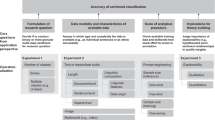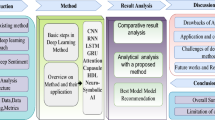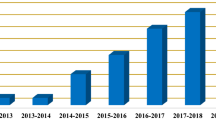Abstract
Aspect sentiment triplet extraction (ASTE) aims to extract all aspect terms with their corresponding opinion terms and sentiment polarity simultaneously from reviews. Recent work processed the ASTE task in an end-to-end manner, which fully utilized the interactive relations among tasks and modeled the interactive relations between words. However, span-level features have not been fully explored. To this end, we propose a novel multiscale feature aggregation network (MSFAN) for end-to-end aspect sentiment triplet extraction (E2E-ASTE), which extracts multiscale local feature representations and explores the deeper interactions between aspect terms and opinion terms. We also design a simple span-awareness representation selection mechanism (SRSM) to further obtain span-level word representations. Extensive experimental results indicate that our model significantly outperforms strong baselines and achieves state-of-the-art performance.











Similar content being viewed by others
References
Zhu L, Xu M, Xu Y, Zhu Z, Zhao Y, Kong X (2022) A multi-attribute decision making approach based on information extraction for real estate buyer profiling. World Wide Web 1–19
Catelli R, Fujita H, Pietro GD, Esposito M (2022) Deceptive reviews and sentiment polarity: effective link by exploiting BERT. Expert Syst Appl 209:118290. https://doi.org/10.1016/j.eswa.2022.118290
Zhao H, Huang L, Zhang R, Lu Q, Xue H (2020) Spanmlt: a span-based multi-task learning framework for pair-wise aspect and opinion terms extraction. In: Proceedings of the 58th annual meeting of the association for computational linguistics. https://doi.org/10.18653/v1/2020.acl-main.296. Association for Computational Linguistics, pp 3239–3248
Chen S, Liu J, Wang Y, Zhang W, Chi Z (2020) Synchronous double-channel recurrent network for aspect-opinion pair extraction. In: Proceedings of the 58th annual meeting of the association for computational linguistics. https://doi.org/10.18653/v1/2020.acl-main.582. Association for Computational Linguistics, pp 6515–6524
Chen F, Huang Y (2019) Knowledge-enhanced neural networks for sentiment analysis of chinese reviews. Neurocomputing 368:51–58. https://doi.org/10.1016/j.neucom.2019.08.054
Xu L, Chia YK, Bing L (2021) Learning span-level interactions for aspect sentiment triplet extraction. In: Proceedings of the 59th annual meeting of the association for computational linguistics and the 11th international joint conference on natural language processing (Volume 1: Long Papers). https://doi.org/10.18653/v1/2021.acl-long.367. Association for Computational Linguistics, pp 4755–4766
Peng H, Xu L, Bing L, Huang F, Lu W, Si L (2020) Knowing what, how and why: a near complete solution for aspect-based sentiment analysis. In: The thirty-fourth AAAI conference on artificial intelligence, AAAI 2020, the thirty-second innovative applications of artificial intelligence conference, IAAI 2020, the tenth AAAI symposium on educational advances in artificial intelligence, EAAI 2020, New York, NY, USA, February 7–12, 2020. https://ojs.aaai.org/index.php/AAAI/article/view/6383. AAAI Press, pp 8600–8607
Wu Z, Ying C, Zhao F, Fan Z, Dai X, Xia R (2020) Grid tagging scheme for aspect-oriented fine-grained opinion extraction. In: Findings of the association for computational linguistics: EMNLP 2020. https://doi.org/10.18653/v1/2020.findings-emnlp.234. Association for Computational Linguistics, pp 2576–2585
Wang X, Tang M, Yang T, Wang Z (2021) A novel network with multiple attention mechanisms for aspect-level sentiment analysis. Knowl Based Syst 227:107196. https://doi.org/10.1016/j.knosys.2021.107196
Liu M, Zhou F, Chen K, Zhao Y (2021) Co-attention networks based on aspect and context for aspect-level sentiment analysis. Knowl Based Syst 217:106810. https://doi.org/10.1016/j.knosys.2021.106810
Huang B, Guo R, Zhu Y, Fang Z, Zeng G, Liu J, Wang Y, Fujita H, Shi Z (2022) Aspect-level sentiment analysis with aspect-specific context position information. Knowl Based Syst 243:108473. https://doi.org/10.1016/j.knosys.2022.108473
Xia F, Wang L, Tang T, Chen X, Kong X, Oatley G, King I. (2022) Cengcn: centralized convolutional networks with vertex imbalance for scale-free graphs. IEEE Transactions on Knowledge and Data Engineering
Wu H, Zhang Z, Shi S, Wu Q, Song H (2022) Phrase dependency relational graph attention network for aspect-based sentiment analysis. Knowl Based Syst 236:107736. https://doi.org/10.1016/j.knosys.2021.107736
Liang B, Su H, Gui L, Cambria E, Xu R (2022) Aspect-based sentiment analysis via affective knowledge enhanced graph convolutional networks. Knowl Based Syst 235:107643. https://doi.org/10.1016/j.knosys.2021.107643
Cambria E, Li Y, Xing FZ, Poria S, Kwok K (2020) Senticnet 6: Ensemble application of symbolic and subsymbolic AI for sentiment analysis. In: CIKM ’20: The 29tTh ACM international conference on information and knowledge management, virtual event, ireland, October 19–23, 2020. https://doi.org/10.1145/3340531.3412003. ACM, pp 105–114
Lu Q, Zhu Z, Zhang G, Kang S, Liu P (2021) Aspect-gated graph convolutional networks for aspect-based sentiment analysis. Appl Intell 51(7):4408–4419. https://doi.org/10.1007/s10489-020-02095-3
Zhang C, Li Q, Song D, Wang B (2020) A multi-task learning framework for opinion triplet extraction. In: Findings of the association for computational linguistics: EMNLP 2020. https://doi.org/10.18653/v1/2020.findings-emnlp.72. Association for Computational Linguistics, pp 819–828
Dozat T, Manning CD (2017) Deep biaffine attention for neural dependency parsing. In: 5th international conference on learning representations, ICLR 2017, toulon, France, April 24–26, 2017, conference track proceedings
Chen Z, Huang H, Liu B, Shi X, Jin H (2021) Semantic and syntactic enhanced aspect sentiment triplet extraction. In: Zong C, Xia F, Li W, Navigli R (eds) Findings of the association for computational linguistics: ACL/IJCNLP 2021, online event, august 1-6, 2021. https://doi.org/10.18653/v1/2021.findings-acl.128. Association for Computational Linguistics, pp 1474–1483
Hamilton WL, Ying Z, Leskovec J (2017) Inductive representation learning on large graphs. In: Guyon I, von Luxburg U, Bengio S, Wallach HM, Fergus R, Vishwanathan SVN, Garnett R (eds) Advances in neural information processing systems 30: annual conference on neural information processing systems 2017, December 4–9, 2017, Long Beach, CA, USA, pp 1024–1034
Xu L, Li H, Lu W, Bing L (2020) Position-aware tagging for aspect sentiment triplet extraction. In: Proceedings of the 2020 conference on empirical methods in natural language processing (EMNLP). https://doi.org/10.18653/v1/2020.emnlp-main.183. Association for Computational Linguistics, pp 2339–2349
Yan H, Dai J, Ji T, Qiu X, Zhang Z (2021) A unified generative framework for aspect-based sentiment analysis. In: Proceedings of the 59th annual meeting of the association for computational linguistics and the 11th international joint conference on natural language processing (Volume 1: Long Papers). https://doi.org/10.18653/v1/2021.acl-long.188. Association for Computational Linguistics, pp 2416–2429
Lewis M, Liu Y, Goyal N, Ghazvininejad M, Mohamed A, Levy O, Stoyanov V, Zettlemoyer L (2020) BART: denoising sequence-to-sequence pre-training for natural language generation, translation, and comprehension. In: Jurafsky D, Chai J, Schluter N, Tetreault JR (eds) Proceedings of the 58th annual meeting of the association for computational linguistics, ACL 2020, Online, July 5–10, 2020. https://doi.org/10.18653/v1/2020.acl-main.703. Association for Computational Linguistics, pp 7871–7880
Mao Y, Shen Y, Yu C, Cai L (2021) A joint training dual-mrc framework for aspect based sentiment analysis. In: Thirty-fifth AAAI conference on artificial intelligence, AAAI 2021, thirty-third conference on innovative applications of artificial intelligence, IAAI 2021, the eleventh symposium on educational advances in artificial intelligence, EAAI 2021, virtual event, February 2–9, 2021. https://ojs.aaai.org/index.php/AAAI/article/view/17597. AAAI Press, pp 13543–13551
Chen S, Wang Y, Liu J, Wang Y (2021) Bidirectional machine reading comprehension for aspect sentiment triplet extraction. In: Thirty-fifth AAAI conference on artificial intelligence, AAAI 2021, thirty-third conference on innovative applications of artificial intelligence, IAAI 2021, the eleventh symposium on educational advances in artificial intelligence, EAAI 2021, virtual event, February 2–9, 2021. https://ojs.aaai.org/index.php/AAAI/article/view/17500. AAAI Press, pp 12666–12674
Jin N, Wu J, Ma X, Yan K, Mo Y (2020) Multi-task learning model based on multi-scale CNN and LSTM for sentiment classification. IEEE Access 8:77060–77072. https://doi.org/10.1109/ACCESS.2020.2989428
Pontiki M, Galanis D, Pavlopoulos J, Papageorgiou H, Androutsopoulos I, Manandhar S (2014) Semeval-2014 task 4: aspect based sentiment analysis. In: Proceedings of the 8th international workshop on semantic evaluation (SemEval 2014). https://doi.org/10.3115/v1/S14-2004. Association for Computational Linguistics, Dublin, pp 27–35
Pontiki M, Galanis D, Papageorgiou H, Manandhar S, Androutsopoulos I (2015) Semeval-2015 task 12: aspect based sentiment analysis. In: Proceedings of the 9th international workshop on semantic evaluation (SemEval 2015). https://doi.org/10.18653/v1/S15-2082. Association for Computational Linguistics, pp 486–495
Pontiki M, Galanis D, Papageorgiou H, Androutsopoulos I, Manandhar S, AL-Smadi M, Al-Ayyoub M, Zhao Y, Qin B, De Clercq O, Hoste V, Apidianaki M, Tannier X, Loukachevitch N, Kotelnikov E, Bel N, Jiménez-Zafra SM, Eryiğit G (2016) Semeval-2016 task 5: aspect based sentiment analysis. In: Proceedings of the 10th international workshop on semantic evaluation (SemEval-2016). https://doi.org/10.18653/v1/S16-1002. Association for Computational Linguistics, pp 19–30
Pennington J, Socher R, Manning C (2014) Glove: global vectors for word representation. In: Proceedings of the 2014 conference on empirical methods in natural language processing (EMNLP). https://doi.org/10.3115/v1/D14-1162. Association for Computational Linguistics, pp 1532–1543
Bojanowski P, Grave E, Joulin A, Mikolov T (2017) Enriching word vectors with subword information. Trans Assoc Comput Linguistics 5:135–146
Kingma DP, Ba J (2015) Adam: a method for stochastic optimization. In: Bengio Y, Lecun Y (eds) 3rd international conference on learning representations, ICLR 2015, San Diego, CA, USA, May 7–9, 2015. arXiv:1412.6980. Conference Track Proceedings, pp 1412–6980
Chen H, Zhai Z, Feng F, Li R, Wang X (2022) Enhanced multi-channel graph convolutional network for aspect sentiment triplet extraction. In: Proceedings of the 60th annual meeting of the association for computational linguistics (Volume 1: Long Papers), ACL 2022, Dublin, Ireland, May 22–27, 2022. https://doi.org/10.18653/v1/2022.acl-long.212. Association for Computational Linguistics, pp 2974–2985
Acknowledgements
We would like to thank the anonymous reviewers for their insightful comments. This work was supported by the National Natural Science Foundation of China (No. 62176234, 62072409, 61701443).
Author information
Authors and Affiliations
Corresponding author
Ethics declarations
Conflict of Interests
The authors declare that they have no known competing financial interests or personal relationships that could have appeared to influence the work reported in this paper.
Additional information
Publisher’s note
Springer Nature remains neutral with regard to jurisdictional claims in published maps and institutional affiliations.
Rights and permissions
Springer Nature or its licensor (e.g. a society or other partner) holds exclusive rights to this article under a publishing agreement with the author(s) or other rightsholder(s); author self-archiving of the accepted manuscript version of this article is solely governed by the terms of such publishing agreement and applicable law.
About this article
Cite this article
Zhu, L., Xu, M., Zhu, Z. et al. Multiscale feature aggregation network for aspect sentiment triplet extraction. Appl Intell 53, 17762–17777 (2023). https://doi.org/10.1007/s10489-022-04402-6
Accepted:
Published:
Issue Date:
DOI: https://doi.org/10.1007/s10489-022-04402-6




